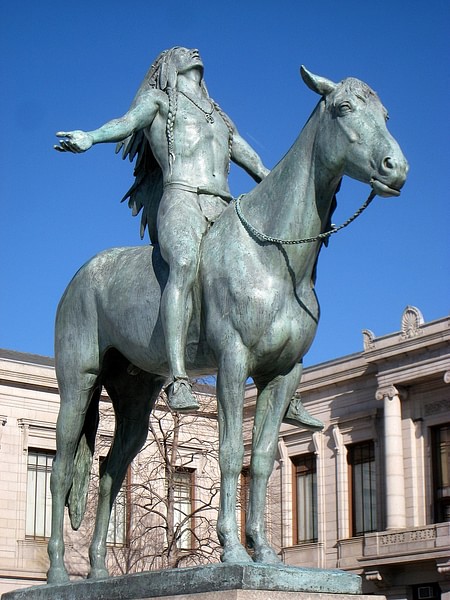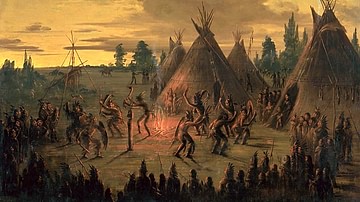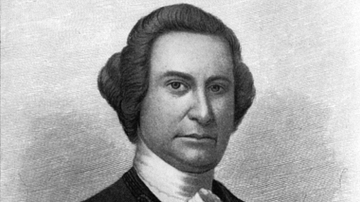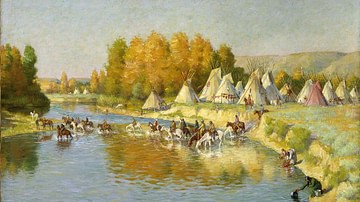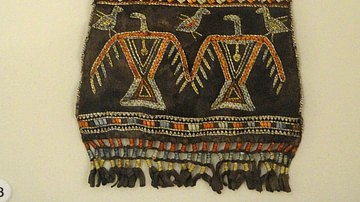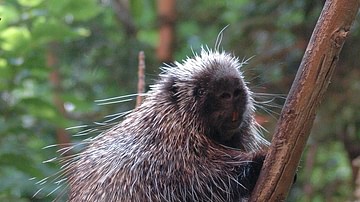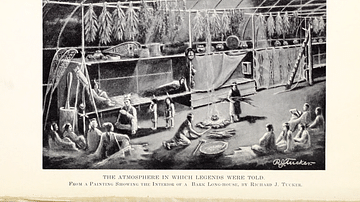The Sky Beings: Thunder and His Helpers is a legend of the Haudenosaunee (Iroquois) Confederacy of the Six Nations of the Cayuga, Mohawk, Oneida, Onondaga, Seneca, and Tuscarora. The story features the supernatural entities known as the Thunders who serve the Great Spirit by righting wrongs and maintaining balance in the world.
The origins of the Haudenosaunee (Iroquois) Confederacy include how the Great Peacemaker, Dekanawida, was sent by the Great Spirit (Hawenneyu) to unite the nations and establish peace. This story is fully told in De-Ka-Nah-Wi-Da and Hiawatha. The Iroquois believe there are many spirits, in the higher realms and on earth, who help the Great Spirit to care for the living things of the world, and among the many are Thunder (who brings life-giving rain) and the Four Thunders, who balance the world by helping the innocent who have been wronged and punishing those who wronged them.
Sometimes, as is seen in this story, the Thunders destroy the immediate cause of suffering but leave other wrongdoers to wrestle with their own misdeeds. The young hero of the tale never says "even one unkind thing about his friends" who betrayed him, and it is assumed that the Thunders take their cue from his act of forgiveness and leave the two alone (Marriott/Rachlin, 39). In other cases, however, they act decisively, destroying the agent of evil who has caused imbalance and suffering in the world.
As with other Native peoples of North America, the Iroquois do not believe that evil is an integral aspect of the created world but is caused by entities, whether human or supernatural, who have made bad choices counter to the will of the Great Spirit, primarily by placing their needs and interests above those of others. According to Iroquois belief, these spirits and people will never escape the justice meted out by the Thunders, and, no matter what one might be suffering, one can take comfort in the faith that these powerful entities, in the service of Ultimate Good, are at hand to help, even if their arrival takes longer than one would like it to.
Text
The following text is taken from American Indian Mythology by Alice Marriott and Carol K. Rachlin. The story appears in many different versions and is also known simply as The Thunderers. The best-known version of The Thunderers was recorded in English by the American-Canadian ethnologist Horatio Hale (l. 1817-1896) and is included in Myths of the Iroquois (1883) by Erminnie A. Smith. The following version of the story was told to Alice Marriott by the Seneca woman Malinda Peacock in the 1960s.
Once, long ago, three young men went hunting together. They were brother-friends, who had promised to care for each other's lives as if each were his own.
The three brother-friends were far from home when one of them tripped on a twisted root and fell heavily to the ground. His leg was bent back under him and, when his friends lifted him up, they saw that it was broken.
"Don't leave me, my friends," the injured man begged. "You know what we have promised each other. Help me to get home to my mother, for she has no one else to take care of her."
So, the two young men who weren't hurt helped him. They made splints of saplings and bound them around the broken leg with vines. They covered his whole leg with rawhide and, between them, helped their friend start for home.
As they went on, the lame man grew heavier and heavier on his friends' shoulders. They stopped sometimes and laid him down so he could rest. When the three started on, the two who were not hurt changed sides so the balance would not be destroyed. Each time the three men stopped, the two who were not hurt were more tired. They looked at each other over their injured friend's head and, with their eyes, the wo agreed to a plan.
At last, as they trudged along a high ridge, the three came to a deep ravine. There, the two who were not hurt took hold of their brother-friend and swung him up in the air, over the edge of the ravine, and dropped him. Quickly, the two men turned away and hurried home. They entered the village with tears streaming down their faces, weeping and mourning.
"What has happened? What has happened?" all the people in the village cried out, as they came running to meet the returning hunters.
"Oh, our poor friend!" they wailed. "As we went through the woods, an enemy attacked us. We fought them off, but a last stray arrow struck our brother, and he is dead."
"Oh, my son! My son!" wept his mother. "I am alone in my old age, with no one to care for me. How can I live without my poor boy?"
"That's all right, mother," his friends said. "We will take care of you."
"How can I rest?" the mother mourned. "If he had died at home, his clansmen would have buried him, and I would know his soul was safe!"
"Don't worry about that," the friends assured her. "We buried him deep and safe. No ugly spirits can reach him, and no wild animals can dig him up."
The mother was a little comforted then. As time went on, she stopped mourning outwardly, although her heart was always hurting for her boy.
The young man fell to the bottom of the crevice in the mountains, where his friends had dropped him, and lay there unconscious for many hours. When he opened his eyes, he saw an old man sitting beside him. The old man's long, gray hair hung loose on his shoulders, and his scalp lock had grown out to the same length as the rest. Behind him, there was a cave in the side of the ravine. There was something strange about that old man. The hunter did not know what it was.
"Who are you?" the young man asked.
"I live here," the old man answered him, without giving his name. "This is my home. How did you come here? You could not have walked, with a broken leg."
"My friends dropped me over the edge," the young man replied. "How could they treat me like that? I trusted them; we were like brothers to each other. How can I get home? Who will take care of my mother? They threw me away to die."
"Stay here with me and do what I tell you, and you won't die," said the old man. "If you obey me, you will be all right."
"What do you want me to do?" the young man asked.
"I need someone to hunt for me," the old man told him. "I am too old to go out and hunt for myself. I can cure you, and when I do, you must promise to stay here and bring me whatever game you kill. I will save your life, but you must take care of me in return."
"I promise," said the young man.
The old man went away, and when he came back, he brought a bowl full of water, and another one full of herbs. He soaked the herbs in the water while he cut off the bandage and drew the splints away from the injured leg. Then the old man bound herb compresses over the injury, and soon the leg began to heal.
By fall, the young man was well again, and he went out hunting every day. Usually, he found only enough game to carry home himself, but sometimes he killed a deer or elk which was too much for one man to load and carry. Then the old man came out and helped the young one, and they brought the game in together. The hunter never tried to climb the walls of the ravine where the cave was hidden.
The young man hunted all winter. Then it was spring. The warm winds blew, and soft showers fell. Animals that had been in hiding all winter came out of their dens, and the hunting was better than it had been in the cold weather. The young man wondered what life as like outside the ravine.
One day, the young man saw huge footprints on the ground. He tracked them, up the canyon walls, across the flats, to the edge of the deep woods, and came upon a black bear – the biggest he had ever seen. The bear did not see the man, and the hunter killed him with a single arrow, right in the heart.
As he bent over to feel the bear's fatness and guess its weight, the young man heard voices speaking behind him. He had never met anyone on his earlier hunting trips, but now he was outside the ravine. He turned and saw four men, dressed in strange, cloudlike, robes, standing behind him, watching him.
"Who are you?" the young man asked.
"We are the Thunders," the four cloud-figures answered. "We were put here on earth to help everybody – all the people – whoever is in need. We are supposed to keep order in the world. If there is drought, we bring rain. If there are cruel people or mean animals, we destroy them. Now we are looking for the old man who lives in the deep ravine, for he is a very bad man."
"I work for him," the hunter said. "I killed this bear for him. He saved my life, so whatever he tells me to do, I must do."
"Are you happy with this life?" the Thunders asked.
"No," answered the young man. "I want to go back to my own people. My mother needs me."
"If you will help us against the old man who is taking all your food and turning you as thin as an eel in the springtime, we will take you home," said the Thunderers. "That is part of our work, to keep the people well and happy."
"I will help you," the young man promised.
"Then do as we tell you," the Thunderers directed him. "Go back to the old man and tell him you have killed a bear. Tell him it is too heavy for you to carry alone, and ask him to help you bring it in."
The young man did as the Thunders told him. The old man was angry because his servant had left the ravine but was delighted when he heard there would be fat bear meat. He took his stone knife, sharpened as keen as it could be, to cut up the bear. They started off, with the old man hurrying ahead of the young one, in his eagerness to reach the game.
"There it is! I see it! He cried as they came upon the black, furry mound.
The two men went to work and, soon, the bear was skinned and cut up, ready to take home.
"Put it all on my shoulders," the old man ordered, and when the young man hesitated, because he did not think the old one could carry such a load, he insisted, "More! More! Pile it on! I can hardly wait to get home to eat some of that fat meat!"
It was getting late now and the sky was getting darker.
"Do you think it will rain? Do you see any clouds?" the old man asked. He was bent over under the burden he insisted on carrying.
"No, it's all clear," the young man assured him, and they started home.
"Let me know if you see even a tiny cloud," the old man ordered, and the young man said, "All right."
Soon, there was a cloud to the northeast, but the young man didn't say anything. The cloud grew nearer and nearer and larger and larger, until it stopped before them, and the Thunders stepped out of its folds. The old man dropped his load and started to run away. He turned himself into a giant porcupine and shot poisoned quills backward at his enemies.
But the Thunders turned the quills aside with their power and followed him, throwing lightning bolts ahead of them. Just as the old man porcupine reached his cave, the lightning struck him, and he fell to the ground dead.
"Now we have finished our work here," the Thunders said. "That old man made slaves of everybody, until he wore them out and killed them."
"Thank you, thank you!" the young man exclaimed. "How can I ever show you how grateful I am?"
"Perhaps someday you will do something for us," The Thunders assured him. "A time will come when you can make your return. Now, hurry, because your mother is still grieving for you."
They gave the young man a cloud robe like theirs to wear and showed him how to move the wings fastened to its shoulders. The young man hurried home and came down in his mother's corn field late at night. He took off his cloud robe and hid it away and then ran to the house. He drew aside the mat over the door of the little bark house where his mother lived all alone.
The mother was sitting there, combing her hair before she went to bed. She looked up and saw her son standing in the door and she was frightened. "Who are you? What are you doing here? I have done nothing wrong; no ghost should come after me!" she cried.
"Don't be frightened, Mother," he reassured her. "It really is I, your son, and not a ghost at all."
"Come in," said the mother, and held out her arms to him as if he were a little boy again. And so the hugged each other and cried together with happiness because they were united once more.
Next morning, the Thunders came to see that all was well. When they saw how happy the young man and his mother were, the Thunders were much pleased. "That's good, that's the way we like to see good people live," they said. "Then we know we have done what we were sent to earth to do. Do right to everyone, and you will be happy always."
"Are you going to leave us?" the young man cried.
"Our work is finished for this year," said the Thunders. "We will be back again, many times. Keep the cloud robe, and when we come again, you can travel with us, and perhaps help us with our work."
The young man and his mother hid the cloud robe away. The mother took care of the garden, and the young man hunted and fished. They lived well and were happy and prosperous. When people in the village asked the young man where he had been, he only told them that he had been away and had come back. He would not say even one unkind thing about his friends.
In the spring, the Thunders returned. "Come and fly with us, friend," they said.
The young man took out his cloud robe and put it on. Then he and the Thunders flew above the earth, watching for people who were wronged or unhappy, and putting things right for them again. Sometimes, the fliers dipped down to the earth and drank from ponds and streams. Sometimes they soared high in the sky until the earth was only a speck below them. But they always knew where they were needed and those were the places where they alighted.
"We are looking for our enemies," the Thunders said. "There is one more, who does great harm to mankind. When we find and destroy him, then everything will be all right."
One day, the young man dropped down to earth and drank from a pool he had seen from the air. When he rose again, and rejoined the Thunders, they saw that his lips were coated with something shiny, like oil.
"What is that?" the Thunders asked. "How did you get that shine on your mouth?"
"I drank from that little pool down there," the young man said, and he showed the Thunders which pool it was.
"That is the place we have been looking for!" the Thunders exclaimed. "That's the pool where our enemy lives. We would never have found it except for the oil he puts out, which coated your lips. Now, you see, you have made your return. You found our enemy for us."
The Thunders all worked together. They made a great bolt of lightning and hurled it into the pond. The lightning was so strong it blasted the pool open and, in the bottom of it, there was a great grub, like the cutworms that chew down young plants in the gardens, but a thousand, thousand times as big.
"He's dead!" cried the young man.
"Yes," said the Thunders. "From now on, the spring lightning will kill all the grubs in your gardens. If people will turn the earth in the spring so the lightning can get to it, we will make it clean. Go home now and tell your people this."
The young man hurried home to take the message to all the people. From that time on, the people honored the Thunders and respected them, and they never broke ground until after the first Thunder came in the spring.


